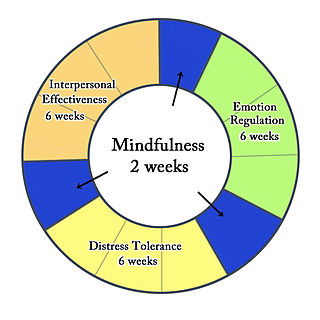Related Research Articles

Borderline personality disorder (BPD), also known as emotionally unstable personality disorder (EUPD), is a personality disorder characterized by a long-term pattern of intense and unstable interpersonal relationships, distorted sense of self, and strong emotional reactions. Those affected often engage in self-harm and other dangerous behaviors, often due to their difficulty with returning their emotional level to a healthy or normal baseline. They may also struggle with a feeling of emptiness, fear of abandonment, and dissociation.

Dialectical behavior therapy (DBT) is an evidence-based psychotherapy that began with efforts to treat personality disorders and interpersonal conflicts. Evidence suggests that DBT can be useful in treating mood disorders and suicidal ideation as well as for changing behavioral patterns such as self-harm and substance use. DBT evolved into a process in which the therapist and client work with acceptance and change-oriented strategies and ultimately balance and synthesize them—comparable to the philosophical dialectical process of thesis and antithesis, followed by synthesis.
Psychological trauma is an emotional response caused by severe distressing events such as accidents, violence, sexual assault, terror, or sensory overload.

Art therapy is a distinct discipline that incorporates creative methods of expression through visual art media. Art therapy, as a creative arts therapy profession, originated in the fields of art and psychotherapy and may vary in definition.

Complex post-traumatic stress disorder (CPTSD) is a stress-related mental disorder generally occurring in response to complex traumas, i.e. commonly prolonged or repetitive exposures to a series of traumatic events, within which individuals perceive little or no chance to escape.
Feminist therapy is a set of related therapies arising from what proponents see as a disparity between the origin of most psychological theories and the majority of people seeking counseling being female. It focuses on societal, cultural, and political causes and solutions to issues faced in the counseling process. It openly encourages the client to participate in the world in a more social and political way.
Prolonged exposure therapy (PE) is a form of behavior therapy and cognitive behavioral therapy designed to treat post-traumatic stress disorder. It is characterized by two main treatment procedures – imaginal and in vivo exposures. Imaginal exposure is repeated 'on-purpose' retelling of the trauma memory. In vivo exposure is gradually confronting situations, places, and things that are reminders of the trauma or feel dangerous. Additional procedures include processing of the trauma memory and breathing retraining.
Vicarious trauma (VT) was a term invented by McCann and Pearlman that is used to describe how working with traumatized clients affects trauma therapists. Previously, the phenomenon was referred to as secondary traumatic stress coined by Dr. Charles Figley. The theory behind vicarious trauma is that the therapist has a profound world change and is permanently altered by the interaction of empathetic bonding with a client. This change is thought to have three conditional requirements: empathic engagement and exposure to graphic and traumatizing material, the therapist being exposed to human cruelty, and reenactment of trauma within the therapy process. This change can produce changes in a therapist's sense of spirituality, worldview, and self-identity.
The mainstay of management of borderline personality disorder is various forms of psychotherapy with medications being found to be of little use.
PTSD or post-traumatic stress disorder, is a psychiatric disorder characterised by intrusive thoughts and memories, dreams or flashbacks of the event; avoidance of people, places and activities that remind the individual of the event; ongoing negative beliefs about oneself or the world, mood changes and persistent feelings of anger, guilt or fear; alterations in arousal such as increased irritability, angry outbursts, being hypervigilant, or having difficulty with concentration and sleep.

Transgenerational trauma is the psychological and physiological effects that the trauma experienced by people has on subsequent generations in that group. The primary modes of transmission are the uterine environment during pregnancy causing epigenetic changes in the developing embryo, and the shared family environment of the infant causing psychological, behavioral and social changes in the individual. The term intergenerational transmission refers to instances whereby the traumatic effects are passed down from the directly traumatized generation [F0] to their offspring [F1], and transgenerational transmission is when the offspring [F1] then pass the effects down to descendants who have not been exposed to the initial traumatic event - at least the grandchildren [F2] of the original sufferer for males, and their great-grandchildren [F3] for females.
Trauma focused cognitive behavioral therapy (TF-CBT) is an evidence-based psychotherapy or counselling that aims at addressing the needs of children and adolescents with post traumatic stress disorder (PTSD) and other difficulties related to traumatic life events. This treatment was developed and proposed by Drs. Anthony Mannarino, Judith Cohen, and Esther Deblinger in 2006. The goal of TF-CBT is to provide psychoeducation to both the child and non-offending caregivers, then help them identify, cope, and re-regulate maladaptive emotions, thoughts, and behaviors. Research has shown TF-CBT to be effective in treating childhood PTSD and with children who have experienced or witnessed traumatic events, including but not limited to physical or sexual victimization, child maltreatment, domestic violence, community violence, accidents, natural disasters, and war.
Eclectic psychotherapy is a form of psychotherapy in which the clinician uses more than one theoretical approach, or multiple sets of techniques, to help with clients' needs. The use of different therapeutic approaches will be based on the effectiveness in resolving the patient's problems, rather than the theory behind each therapy.
Betrayal trauma is defined as a trauma perpetrated by someone with whom the victim is close to and reliant upon for support and survival. The concept originally introduced by Jennifer Freyd in 1994, betrayal trauma theory (BTT), addresses situations when people or institutions on which a person relies for protection, resources, and survival violate the trust or well-being of that person. BTT emphasizes the importance of betrayal as a core antecedent of dissociation implicitly aimed at preserving the relationship with the caregiver. BTT suggests that an individual, being dependent on another for support, will have a higher need to dissociate traumatic experiences from conscious awareness in order to preserve the relationship.
Psychotraumatology is the study of psychological trauma. Specifically, this discipline is involved with treating, preventing, and researching traumatic situations and people's reactions to them. It particularly focuses on the treatment of post-traumatic stress disorder (PTSD) and acute stress disorder (ASD), but can be used to treat any adverse reactions a person may have after experiencing a traumatic event.
Borderline personality disorder (BPD) is a psychological disorder characterized by chronic instability of relationships, self-image, moods, and affect, which is frequently misdiagnosed. This misdiagnosis can come in the form of providing a BPD diagnosis to a person who does not actually meet criteria or providing an incorrect alternative diagnosis in the place of a BPD diagnosis.
Religious trauma syndrome (RTS) is not present in the Diagnostic and Statistical Manual (DSM-5) or any DSM-5TR materials, nor is it represented in the ICD-10, but it has been recognized by individual psychologists and psychotherapists as a set of symptoms, ranging in severity, experienced by those who have participated in or left behind authoritarian, dogmatic, and controlling religious groups and belief systems. Symptoms include cognitive, affective, functional, and social/cultural issues as well as developmental delays.
Sexual trauma therapy is medical and psychological interventions provided to survivors of sexual violence aiming to treat their physical injuries and cope with mental trauma caused by the event. Examples of sexual violence include any acts of unwanted sexual actions like sexual harassment, groping, rape, and circulation of sexual content without consent.
LGBT trauma is the distress an individual experiences due to being a lesbian, gay, bisexual, trans, queer person or from possessing another minoritized sexual or gender identity. This distress can be harmful to the individual and predispose them to trauma- and stressor-related disorders.
Imagery Rescripting is an experiential therapeutic technique that uses imagery and imagination to intervene in traumatic memories. The process is guided by a therapist who works with the client to define ways to work with particular traumatic memories, images, or nightmares.
References
- 1 2 Evans, Kathy M.; Kincade, Elizabeth A.; Marbley, Aretha F.; Seem, Susan R. (July 2005). "Feminism and Feminist Therapy: Lessons From the Past and Hopes for the Future". Journal of Counseling & Development. 83 (3): 269–277. doi:10.1002/j.1556-6678.2005.tb00342.x. ISSN 0748-9633.
- ↑ American Psychiatric Association Diagnostic and Statistical Manual of Mental Disorders (DSM-IV), 2011
- ↑ Tseris, Emma Jane (2013-04-22). "Trauma Theory Without Feminism? Evaluating Contemporary Understandings of Traumatized Women". Affilia. 28 (2): 153–164. doi:10.1177/0886109913485707. ISSN 0886-1099. S2CID 145084764.
- ↑ Blumer, Markie L. C.; Papaj, Aubree K.; Erolin, Kara S. (April 2013). "Feminist Family Therapy for Treating Female Survivors of Childhood Sexual Abuse". Journal of Feminist Family Therapy. 25 (2): 65–79. doi:10.1080/08952833.2013.777871. ISSN 0895-2833. S2CID 145458249.
- ↑ Brown, Laura S. (2004). "Feminist paradigms of trauma treatment". Psychotherapy: Theory, Research, Practice, Training. 41 (4): 464–471. doi:10.1037/0033-3204.41.4.464. ISSN 1939-1536.
- ↑ Burstow, Bonnie (November 2003). "Toward a Radical Understanding of Trauma and Trauma Work". Violence Against Women. 9 (11): 1293–1317. doi:10.1177/1077801203255555. ISSN 1077-8012. S2CID 73036064.
- ↑ Webster, Denise C.; Dunn, Erin C. (2005-09-14). "Feminist Perspectives on Trauma". Women & Therapy. 28 (3–4): 111–142. doi:10.1300/j015v28n03_06. ISSN 0270-3149. S2CID 49584616.
- ↑ Frew, Jon (2012-05-04). Frew, Jon; Spiegler, Michael D (eds.). Contemporary Psychotherapies for a Diverse World. doi:10.4324/9780203802045. ISBN 9781136624070.
- ↑ Root, M.P. "Reconstructing the impact of trauma on personality". Personality and Psychopathology: Feminist Reappraisals: 229–265.
- ↑ Burstow, Bonnie (2005). "A Critique of Posttraumatic Stress Disorder and the DSM". Journal of Humanistic Psychology. 45 (4): 429–445. doi:10.1177/0022167805280265. S2CID 144094339.
- ↑ Freyd, Jennifer (1996). Betrayal trauma: The logic of forgetting childhood abuse. Harvard University Press.
- ↑ Cohen, Jacqueline N. (2008). "Using feminist, emotion-focused, and developmental approaches to enhance cognitive-behavioral therapies for posttraumatic stress disorder related to childhood sexual abuse". Psychotherapy: Theory, Research, Practice, Training. 45 (2): 227–246. doi:10.1037/0033-3204.45.2.227. ISSN 1939-1536. PMID 22122419.
- ↑ Alafia, J.; Manjula, M. (May 2020). "Emotion Dysregulation and Early Trauma in Borderline Personality Disorder: An Exploratory Study". Indian Journal of Psychological Medicine. 42 (3): 290–298. doi: 10.4103/ijpsym.ijpsym_512_18 . ISSN 0253-7176. PMC 7320739 . PMID 32612335.
- ↑ Kline, N. K., & Palm Reed, K. M. (2018). "Betrayal vs. nonbetrayal trauma: Examining the different effects of social support and emotion regulation on PTSD symptom severity". Psychological Trauma: Theory, Research, Practice and Policy. 28 (2): 441–462.
{{cite journal}}: CS1 maint: multiple names: authors list (link) - ↑ Courtois, Christine A. (2012-09-19). "Feminist Multicultural Counseling with Traumatized Individuals". Oxford Handbooks Online: 373–391. doi:10.1093/oxfordhb/9780199744220.013.0020. ISBN 978-0199744220.
- ↑ Israeli, Anne L; Santor, Darcy A (September 2000). "Reviewing effective components of feminist therapy". Counselling Psychology Quarterly. 13 (3): 233–247. doi:10.1080/095150700300091820. ISSN 0951-5070. S2CID 56116587.
- ↑ Harvey, Mary R. (2007-03-09). "Towards an Ecological Understanding of Resilience in Trauma Survivors". Journal of Aggression, Maltreatment & Trauma. 14 (1–2): 9–32. doi:10.1300/j146v14n01_02. ISSN 1092-6771. S2CID 142569618.
- ↑ Williams, Elizabeth Nutt; Enns, Carolyn Zerbe, eds. (2012-09-19). "The Oxford Handbook of Feminist Multicultural Counseling Psychology". Oxford University Press. doi:10.1093/oxfordhb/9780199744220.001.0001. ISBN 978-0-19-974422-0.
{{cite journal}}: Cite journal requires|journal=(help) - ↑ Richmond, Katherine; Burnes, Theodore R.; Singh, Anneliese A.; Ferrara, Mel (2017), "Assessment and treatment of trauma with TGNC clients: A feminist approach.", Affirmative counseling and psychological practice with transgender and gender nonconforming clients., Washington: American Psychological Association, pp. 191–212, doi:10.1037/14957-010, ISBN 978-1-4338-2300-8 , retrieved 2020-11-25
- ↑ Richmond, Kate; Geiger, Elizabeth; Reed, Carly (2013-09-19). "The Personal is Political". Clinical Case Studies. 12 (6): 443–456. doi:10.1177/1534650113500563. ISSN 1534-6501. S2CID 143761007.